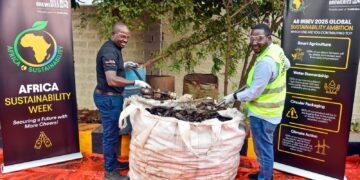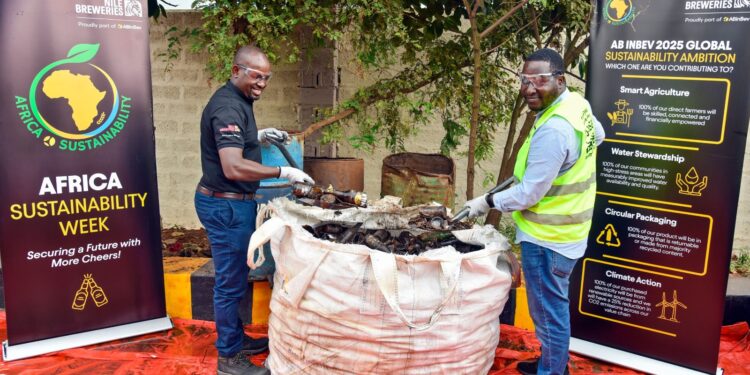To commemorate World Environment Day, Nile Breweries Limited (NBL) has announced the successful completion of a glass bottle recycling pilot, implemented in partnership with local tech startup Yo-Waste under the AB InBev 100+ Accelerator Program.
The pilot, which ran from August 2024 to March 2025, focused on the collection, sorting, and preparation of post-consumer glass waste for recycling.
While Uganda currently lacks in-country glass recycling capacity, the 63 metric tons of glass collected during the initiative were transported to Tanzania.
There, the glass was processed into cullet and reintegrated into AB InBev’s bottle manufacturing supply chain, creating a closed-loop system that reduces environmental impact.
“This initiative shows that circular solutions are still achievable even with limited infrastructure,” said Emmanuel Njuki, Legal & Corporate Affairs Lead at NBL.
We exceeded our initial target of 50 metric tons, collecting 63 metric tons of glass through partnerships with 15 outlets across Kampala and surrounding areas, enabled by a tech-driven collection process using the Yo-Waste mobile app.”
“As the world transitions to more sustainable production models, NBL is proud to lead this shift in Uganda,” Njuki added. “This pilot proves that with local innovation and strong partnerships, we can build a circular packaging system that benefits businesses, communities, and the planet.”
Nile Breweries has long prioritized sustainable packaging. Over 90% of our products are sold in returnable packaging, significantly reducing single-use materials. Our breweries have implemented robust waste segregation systems at source.
Our breweries are on a path of increasing our already high recycling rate and eliminating onsite waste generation through reducing resource use, recycling and reusing materials where possible. So far, our average recycling rate for Jinja and Mbarara breweries stands at above 90%.
Following the pilot’s success, NBL intends to scale up the glass collection initiative, expand to new regions, and roll out consumer awareness campaigns to promote recycling behaviour. “Though Uganda doesn’t yet have domestic glass recycling, this pilot proves the potential. Together with startups like Yo-Waste, we’re helping to build a more sustainable Uganda. Every bottle returned is a step toward a greener future,” said Emmanuel.
This initiative proves the potential of sustainable packaging solutions and aligns with AB InBev’s global sustainability ambition to have 100% of its products in returnable packaging or packaging made from majority recycled content.











